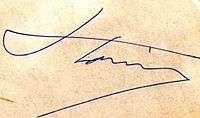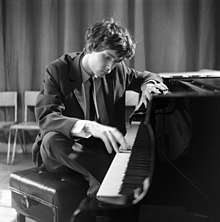Zoltán Kocsis
Zoltán Kocsis (Hungarian: [ˈzoltaːn ˈkot͡ʃiʃ]; 30 May 1952 – 6 November 2016) was a Hungarian pianist, conductor and composer.[1]
.jpg)

Biography
Studies
Born in Budapest, he began his musical studies at the age of five and continued them at the Béla Bartók Conservatory in 1963, studying piano and composition.[2] In 1968 he was admitted to the Franz Liszt Academy of Music, where he was a pupil of Pál Kadosa, Ferenc Rados and György Kurtág, graduating in 1973.
Career

He won the Hungarian Radio Beethoven Competition in 1970, and made his first concert tour of the United States in the following year.[3] He received the Liszt Prize in 1973, and the Kossuth Prize in 1978.[3]
Considered a great pianist, Kocsis performed with the Berlin Philharmonic, Chicago Symphony Orchestra, the San Francisco Symphony Orchestra, the New York Philharmonic, the Staatskapelle Dresden, the Philharmonia of London, and the Vienna Philharmonic.[4] Kocsis recorded the complete solo piano works and works with piano and orchestra of Béla Bartók.[5] In 1990, his recording of Debussy's Images[6] won "The Gramophone" Instrumental Award for that year. He won another with the violinist Barnabás Kelemen in 2013 in the chamber category for the recording of Bartók's Violin Sonatas Nos 1 & 2.[7]
American critic Harold C. Schonberg praised Kocsis' extraordinary technique and fine piano tone.[8] According to Grove Music Online, he had "an impressive technique, and his forthright, strongly rhythmic playing is nevertheless deeply felt and never mechanical. Kocsis has a natural affinity for Bach, but is also a fine exponent of contemporary music and has given the first performances of works by Kurtág."[3]
Conductor
Kocsis co-founded with Iván Fischer the Budapest Festival Orchestra in 1983, thus opening a new epoch in the history of Hungarian orchestral playing.[3] Kocsis played a determining role in the direction and the development of the program policy of the orchestra from its founding, and from 1987 also appeared as a conductor at their concerts.
He became the musical director of the Hungarian National Philharmonic in 1997 and held the title until his death in 2016.
Death
Kocsis died from cancer on 6 November 2016, aged 64, in his native Budapest.[9]
Selected works
Opera
- Kopogtatások (1984–85)
- A vacsora (1984–85)
- Kiállítás (1984–85)
Orchestral and Chamber music
- Premiere, for string orchestra (1976)
- Fészek (1975–76)
- The last but one encounter, for piano, harpsichord (1981)
- 33. December, for chamber ensemble (1983)
- Memento, for string orchestra (Csernobil) (1986)
- Utolsó találkozás (1990)
References
- Zoltán Kocsis - Notable Alumni Liszt Academy
- Hungaroton LP SLPX11711 Liner Notes.
- Várnai, Péter P. (28 February 2002) [20 January 2001]. "Zoltán Kocsis". Grove Music Online (8th ed.). Oxford University Press.
- "Zoltán Kocsis, pianist and 'giant of music', dies aged 64". The Guardian. London. Agence France-Presse. 6 November 2016. Retrieved 4 November 2019.
- Zoltán Kocsis plays Bartók, Philips 8 CD set 475 6720.
- Now issued as Philips CD 475 210-2.
- The gramophone, 2013.
- Harold C. Schonberg, The Great Pianists from Mozart to the Present, Second Edition, Simon & Schuster, 1987
- "Meghalt Kocsis Zoltán, a Nemzeti Filharmonikusok vezetője".
Further reading
- Gelfand, Janelle (19 February 1993). "Pianist helps preserve Hungarian music tradition". The Cincinnati Enquirer. Cincinnati, Ohio. p. 26. Retrieved 25 June 2020 – via Newspapers.com.
Obituaries
- Gorondi, Pablo (7 November 2016). "Conductor, pianist and 'musical giant' who won international awards". South Florida Sun Sentinel. Fort Lauderdale, Florida. p. B6. Retrieved 25 June 2020 – via Newspapers.com.
- Slotnik, Daniel E. (9 November 2016). "Zoltan Kocsis, Pianist and Conductor, Dies at 64". The New York Times. New York City. Retrieved 25 June 2020.
External links
| Wikiquote has quotations related to: Zoltán Kocsis |
- Zoltán Kocsis biography
- Listing and reviews of Kocsis recordings
- TV and Video Productions with Zoltán Kocsis - Directed by János Darvas
- Zoltán Kocsis biodata,
| Cultural offices | ||
|---|---|---|
| Preceded by Ken-Ichiro Kobayashi |
Principal Conductors, Hungarian National Philharmonic Orchestra 1997–2016 |
Succeeded by Zsolt Hamar |